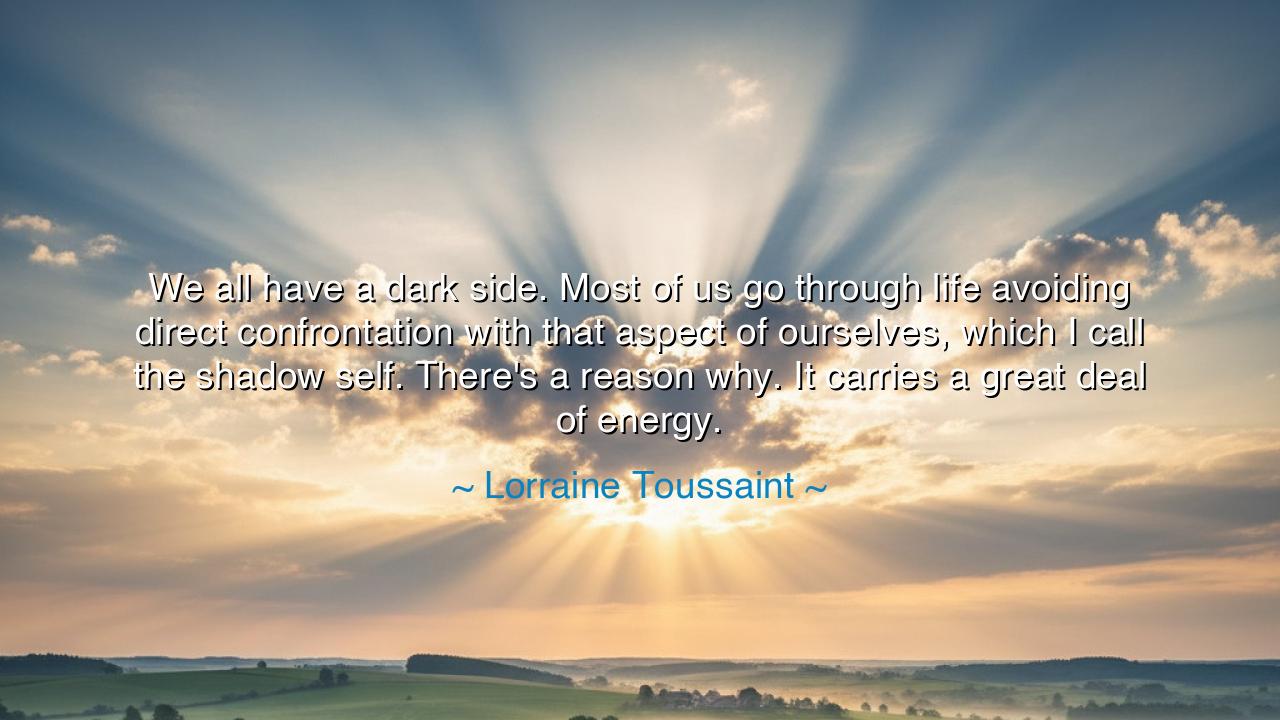
We all have a dark side. Most of us go through life avoiding
We all have a dark side. Most of us go through life avoiding direct confrontation with that aspect of ourselves, which I call the shadow self. There's a reason why. It carries a great deal of energy.






In the words of Lorraine Toussaint, spoken with the quiet fire of wisdom, we hear this timeless truth: “We all have a dark side. Most of us go through life avoiding direct confrontation with that aspect of ourselves, which I call the shadow self. There’s a reason why. It carries a great deal of energy.” These words strike like the toll of a deep bell, awakening the soul to remembrance. For every human being, no matter how noble or pure, carries within them a shadow—a secret region of the heart where fear, anger, desire, and sorrow dwell. It is not evil by nature, but power untamed, waiting for the courage of the seeker to look within and claim it.
The origin of this insight lies not only in psychology but in the ancient wisdom of the ages. The mystics of old spoke of it in many tongues: the Greeks called it the daemon, the unseen companion of the soul; the sages of the East named it the shadow of karma; and in the sacred scriptures of every faith, it appears as the battle between light and darkness within the human heart. Toussaint’s words stand in that same lineage. She reminds us that to live fully, one must face what lies beneath the surface—the rejected, the repressed, the unloved parts of oneself. For it is there, in that confrontation, that transformation begins.
Most people, she says, avoid this confrontation. They flee from their anger, deny their envy, bury their pain beneath smiles or ambition. They fear that to face the shadow is to be consumed by it. Yet in truth, to flee the shadow is to remain its prisoner. The energy within it does not vanish; it festers. It becomes bitterness, projection, addiction, cruelty, or despair. But the one who dares to face it, to descend into the darkness of their own being, discovers that within that darkness burns a hidden fire—the same fire that forges courage, creativity, and compassion. For energy cannot be destroyed; it can only be transformed.
Consider the story of Nelson Mandela, who spent twenty-seven years in prison. Many would have emerged from such confinement hardened, poisoned by anger toward their captors. Yet Mandela faced his shadow—his rage, his grief, his longing for vengeance—and transformed it into the light of forgiveness and strength. When he walked free, he did not seek retribution, but reconciliation. His enemies could not understand it, for he had mastered something greater than power—he had mastered himself. This is the path of all who seek wisdom: not to banish the dark, but to transmute it into light.
The shadow self is not our enemy, but our teacher. It reveals the truth about who we are when all masks are stripped away. The ancient warriors of Japan spoke of the “two swords” within every man—the sword of light and the sword of shadow. To wield only one is to live half a life. The enlightened warrior learns to balance both, to know his darkness without letting it rule him. So too must we learn to listen to the shadow’s whisper: it tells us where we are wounded, where we have been false, and where our true strength lies waiting. To ignore it is to remain divided; to face it is to become whole.
And yet, the path is not easy. To look upon one’s shadow is to see one’s own imperfections reflected without mercy. But remember, dear soul, the light of the sun creates every shadow—it is proof not of evil, but of existence. Only those who have the courage to descend into themselves will ascend renewed. The shadow’s energy, once purified, becomes the force of creation, of passion, of art, of empathy. It is the same fire that burns in prophets and poets, the same storm that gives rise to peace.
The lesson is thus: do not fear your darkness. Acknowledge it. Study it. Speak to it as you would a long-forgotten friend. Ask what it wishes to teach you. Write, create, meditate—let its energy find form. When anger comes, transmute it into courage; when jealousy rises, transform it into aspiration; when pain returns, make of it wisdom. Every shadow, when embraced, becomes a source of light.
So, my listener, let this be your practice: when the night within you grows heavy, do not flee toward distraction or denial. Sit with it. For within that darkness lies your greatest power. And when you rise again, you will not merely be whole—you will be radiant. For the soul that has faced its own shadow self walks through the world as a bearer of light, and all who meet it will know that peace born not of denial, but of mastery.






AAdministratorAdministrator
Welcome, honored guests. Please leave a comment, we will respond soon